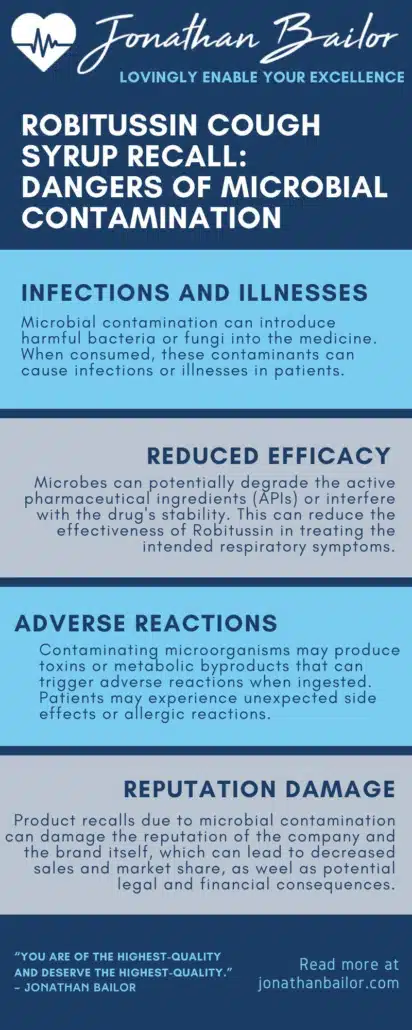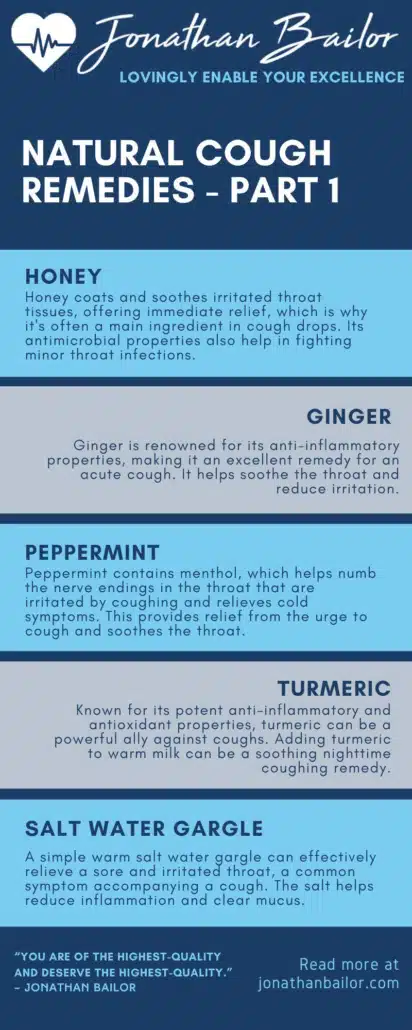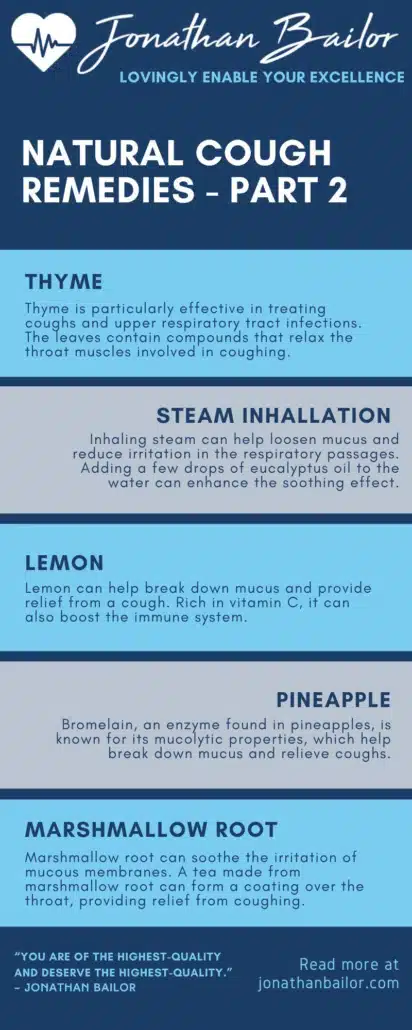Robitussin Cough Syrup Recall: Risks and Safe, Natural Cough Relief
In our journey towards health and well-being, staying informed is essential, especially when it concerns the products we trust to keep us feeling our best. In this Cough and Phlegm guide, Jonathan Bailor discusses the recent recall of certain Robitussin cough syrup products that have brought to light an important conversation about what we turn to for relief when under the weather.
Namely, while it’s essential to understand the risks associated with these recalled products, it’s equally important to know that natural, gentle alternatives are available.
With the abundance of over-the-counter remedies, it’s easy to overlook the power of nature’s own medicine cabinet. So, as we navigate this recall, let’s take a moment to consider the safe, natural ways to soothe a cough. These remedies aren’t just gentle on your body; they can be just as effective, offering comfort without worrying about unwanted ingredients or side effects.
Whether you’re seeking immediate relief or looking for long-term wellness strategies, remember that sometimes, the best solutions are the simplest ones. Let’s explore these natural alternatives together, ensuring that our path to recovery is as safe and nurturing as possible.
The Robitussin Recall
In the landscape of our healthcare choices, the recall of Robitussin cough syrup has emerged as a beacon, urging us to reassess and understand the products we use. This recall specifically involves Robitussin Honey CF Max Day Adult and Robitussin Honey CF Max Nighttime Adult, and it’s due to a concern that touches the core of our well-being: microbial contamination. This type of contamination, while sounding technical, means that the product could potentially harbor microorganisms that are not meant to be there.
For anyone, this is a cause for attention, but it’s particularly crucial for those among us with compromised immune systems. In such individuals, using these contaminated products could lead to severe, even life-threatening, health consequences like fungemia. In this serious condition, fungi enter the bloodstream, potentially affecting various body parts.
These specific Robitussin products were typically sought after for their ability to ease the discomforts brought on by colds, flu, hay fever, or other respiratory allergies – symptoms like coughs, sore throats, and congestion that can turn our days and nights into long battles for comfort and relief.
Identifying whether you have one of these recalled products is straightforward. Check the lot number and expiration date on your Robitussin bottle. The affected lots have specific numbers and expiry dates that the manufacturer has publicly shared. If your bottle’s details match these, you must cease using the product immediately.
For those who find themselves with a recalled product, the next steps are clear and directed towards safeguarding your health. The recommendation is to not only stop using the product but also to reach out to healthcare professionals if you have used it and are concerned about your health. The journey to wellness often involves being proactive and informed; in this instance, taking these steps is part of that journey.

Feeling Better Is Priceless, That's Why We Don't Put A Price On It!
“It’s Like A Free and Medically Valid Version of Noom and Weight Watchers Online”
~ Dr. Doctor Matthew Oleshiak, MD
Click the 'LEARN MORE' button below for free lifetime access to the fast fix program developed by Jonathan and top Ivy League Medical Doctors
LEARN MOREP.S. It's not a free trial. It's not part of the program for free. The entire program is free, forever, for real! No credit card needed.
Understanding Microbial Contamination and its Risks
Like the recent case in certain Robitussin products, microbial contamination in pharmaceuticals is a critical concern. This contamination occurs when harmful microorganisms, unintended in the formulation, find their way into the product. These can be bacteria, viruses, or fungi, and their presence in medicine is not just a flaw in the product—it’s a direct health risk.
Particularly alarming is the risk of fungemia, a condition where fungi enter the bloodstream. This can happen when contaminated products are ingested, allowing the microorganisms to breach our body’s defenses. Fungemia isn’t just a minor inconvenience; it can lead to widespread infections, affecting vital organs. For someone with a robust immune system, the risks are lower, but they’re not negligible. In immunocompromised individuals, the consequences can be severe, even life-threatening.
Given these risks, it’s paramount to be vigilant. Monitoring for symptoms after using potentially contaminated products and seeking medical advice promptly can be crucial in safeguarding health against the unseen dangers of microbial contamination.
Natural Cough Remedies as Alternatives
In the wake of the Robitussin recall, many are seeking natural alternatives to soothe their coughs. Nature offers a bounty of remedies, each with its unique healing properties. These alternatives not only provide relief but also align with a holistic approach to health.
Let’s explore some of these natural remedies, understanding their benefits and how they can be incorporated into our daily wellness routines.
1. Honey
A spoonful of honey is more than just a sweet treat; it’s a time-honored remedy for a cough. (It can even help relieve a chronic cough.)
Honey coats and soothes irritated throat tissues, offering immediate relief, which is why it’s often a main ingredient in cough drops. Its antimicrobial properties also help in fighting minor throat infections.
For an effective remedy for cough and sore throat, mix honey with warm water or herbal tea. Remember, honey is not recommended for children under one year due to the risk of botulism.
2. Ginger
Ginger is renowned for its anti-inflammatory properties, making it an excellent remedy for an acute cough. It helps soothe the throat and reduce irritation.
A ginger tea, made by steeping fresh ginger in hot water, can be both comforting and effective. Adding a bit of honey or lemon can enhance its soothing effects.
3. Peppermint
The menthol present in peppermint has a soothing effect on the irritated nerve endings in the throat, thereby providing relief from cough and other cold symptoms.
Peppermint tea or inhaling peppermint steam can be particularly beneficial for cough and congestion.
4. Turmeric
Known for its potent anti-inflammatory and antioxidant properties, turmeric can be a powerful ally against coughs.
A popular method is to add turmeric to warm milk, known as “golden milk,” which can be a soothing nighttime coughing remedy.
5. Saltwater Gargle
A simple warm salt water gargle can effectively relieve a sore and irritated throat, a common symptom accompanying a cough. The salt helps reduce inflammation and clear mucus.
Mix a teaspoon of salt in a glass of warm water and gargle several times a day.

6. Thyme
Thyme has both culinary and medicinal uses, particularly effective in treating coughs and upper respiratory tract infections. The leaves contain compounds that relax the throat muscles involved in coughing.
Herbal teas that feature thyme leaves can be a simple yet effective remedy.
7. Steam Inhalation
Inhaling steam can help loosen mucus and reduce irritation in the respiratory passages. Adding a few drops of eucalyptus oil to the water can enhance the soothing effect.
Be cautious with hot water to avoid burns.
8. Lemon
Lemon can help break down mucus and provide relief from a cough. Rich in vitamin C, it can also boost the immune system.
Adding lemon juice to warm water or tea is an easy way to take advantage of its benefits.
9. Pineapple
Bromelain, an enzyme found in pineapples, is known for its mucolytic properties, which help break down mucus and relieve coughs.
Consuming pineapple or pineapple juice can be a tasty way to alleviate cough symptoms.
10. Marshmallow Root
Used for centuries in herbal medicine, marshmallow root can soothe the irritation of mucous membranes. A tea made from marshmallow root can form a coating over the throat, providing relief from coughing.
Each of these remedies offers a gentle approach to easing a cough, aligning with nature’s rhythm and our body’s intrinsic healing abilities.
Remember, while these remedies are generally safe, listening to your body and consulting with a healthcare professional for persistent or severe symptoms is essential.

Frequently Asked Questions About Cough and Phlegm
What causes cough and phlegm production?
Cough and phlegm production is often your body’s natural response to irritation or infection in the respiratory tract.
Coughing is a reflex to clear the airways, while phlegm, or mucus, is produced by the cells in your airways as a defense mechanism against irritants like dust, smoke, or pathogens. Infections like the common cold or flu can increase mucus production, leading to a more pronounced cough.
Allergies and conditions like asthma or chronic obstructive pulmonary disease (COPD) can also contribute to these symptoms.
Is coughing up phlegm a sign of getting better?
Coughing up phlegm can be a sign that your body is working to clear an infection or irritant from the lungs and airways.
Phlegm that is clear or white is usually normal and may increase with a cold or flu. However, if the phlegm changes color, such as becoming yellow, green, brown, or bloody, or if you experience additional symptoms like a high fever or shortness of breath, it’s important to consult a healthcare provider.
How can I naturally reduce cough and phlegm?
Staying hydrated helps thin mucus, making it easier to expel. Warm liquids, like herbal teas or broths, can be soothing. Honey can effectively soothe a cough, especially when combined with warm water or tea. Gargling salt water can also help clear phlegm from the throat.
Humidifiers add moisture to the air, easing coughing and phlegm production, especially in dry environments.
When should I be concerned about a cough?
While a cough is a common symptom of many minor respiratory illnesses, certain signs warrant medical attention.
Consult a healthcare provider if your cough is persistent, lasting more than a few weeks, produces discolored or bloody phlegm, is accompanied by high fever, chest pain, or difficulty breathing, or if it significantly disrupts your sleep or daily activities.
Can diet and lifestyle changes help with cough and phlegm?
Yes, diet and lifestyle can influence cough and phlegm production.
Foods rich in vitamin C and zinc can boost your immune system. Avoiding irritants like cigarette smoke and strong perfumes can reduce cough frequency.
Maintaining a healthy weight and regular exercise can improve lung function and overall health, reducing the risk of chronic respiratory conditions that might cause cough and phlegm.
Embracing Wellness: Share the Knowledge
As we journey together through the intricacies of the Robitussin recall and the realm of natural cough remedies, it’s clear that knowledge is not just power – it’s a pathway to better health.
This exploration into safer, more natural ways to address coughs and understanding product safety are vital tools in our wellness toolkit.
If you’ve found value in this discussion, consider sharing it with friends and family. Spread the word on Facebook, Twitter, Instagram, or even via email. By sharing, you’re not just passing on information; you’re extending a hand toward a healthier community.
Feeling Better Is Priceless, That's Why We Don't Put A Price On It!
“It’s Like A Free and Medically Valid Version of Noom and Weight Watchers Online”
~ Dr. Doctor Matthew Oleshiak, MD
Click the 'LEARN MORE' button below for free lifetime access to the fast fix program developed by Jonathan and top Ivy League Medical Doctors
LEARN MOREP.S. It's not a free trial. It's not part of the program for free. The entire program is free, forever, for real! No credit card needed.




